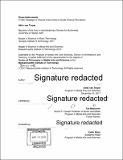Score instruments : a new paradigm of musical instruments to guide musical wonderers
Author(s)
Troyer, Akito van
DownloadFull printable version (51.18Mb)
Alternative title
New paradigm of musical instruments to guide musical wonderers
Other Contributors
Program in Media Arts and Sciences (Massachusetts Institute of Technology)
Advisor
Tod Machover.
Terms of use
Metadata
Show full item recordAbstract
Advancements in technology have made musical instruments, especially electronic instruments, accessible to the masses. As a result, music-making has become more widespread and convenient. However, the blackboxing practices of commercial Digital Musical Instruments (DMIs) have conditioned many users to produce only specific styles of music. Furthermore, as many of these commercial instruments produce sound through loudspeakers, rather than the body of the instrument, players lose the physical and tactile connection to sound and music. Consequently, these DMIs inhibit understanding of the relationship between musicality and our everyday physical world, and cut players off from exploring a more extensive range of musical possibilities. Despite the multiplication of music-making tools, music-making practices still operate on the same principles. The production of music requires instruments to generate organized physical sound energies that follow the schema of a score. This dissertation studies a new class of Interactive Music Systems (IMSs) called Score Instruments that embed both instrument and score into a single unified interface. Score Instruments reopen the range of possibilities offered by everyday sounds and objects as musical bricolage tools to bring players into a personalized, guided, and open-ended use of the instrument. Players of Score Instruments are called Musical Wonderers, as the instruments encourage them to focus on exploration to build their own musical language, rather than on the technically correct realization of music. The dissertation describes the concept of Score Instruments. Two instances of Score Instruments demonstrate how the techniques and criteria translate into specific IMSs. City Symphonies is a massive musical collaboration platform that encourages players to listen to their cities and create music with environmental sounds. MM-RT is a tabletop tangible musical instrument that employs electromagnetic actuators and small permanent magnets to physically induce sounds with found objects. Both projects exemplify how Score Instruments can simultaneously stimulate open creativity and provide meaningful direction and constraints that guide users to learn underlying principles about music and the physical world. The design investigations and historical perspective of this dissertation offer a future of music-making practice that is based on exploration and designed to broaden the definition and variety of music.
Description
Thesis: Ph. D., Massachusetts Institute of Technology, School of Architecture and Planning, Program in Media Arts and Sciences, February 2018. Cataloged from PDF version of thesis. Includes bibliographical references (pages 167-190).
Date issued
2018Department
Program in Media Arts and Sciences (Massachusetts Institute of Technology)Publisher
Massachusetts Institute of Technology
Keywords
Program in Media Arts and Sciences ()